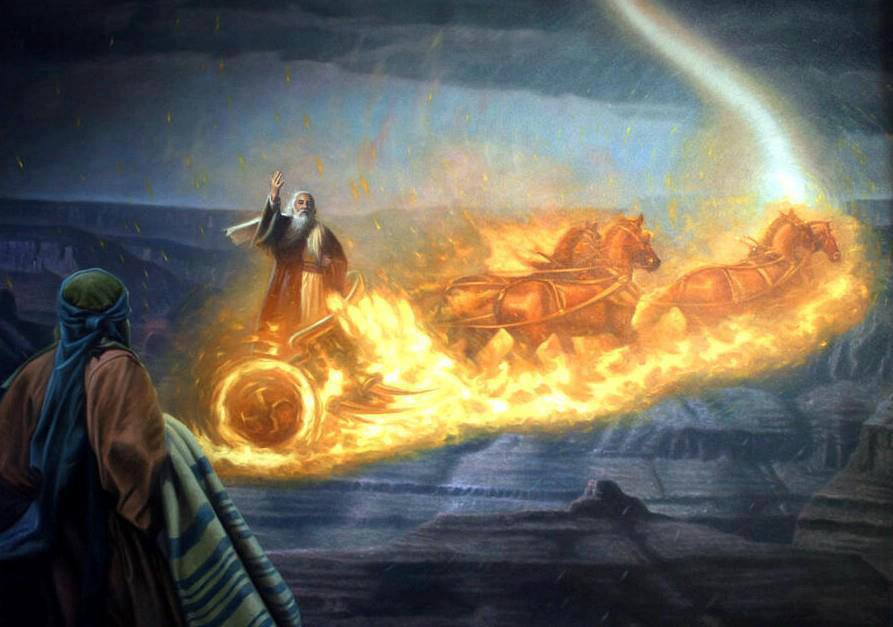QUESTION: Who is Elijah, foretold at Malachi 4:5, who comes before the awe-inspiring day of Jehovah? And what will he accomplish? And is he in fact the one that will be appointed over all the domestics to give them food at the proper time?
The verse in question also happens to be the very last verse of the entire Hebrew collection, which states: “Look! I am sending to you Elijah the prophet before the coming of the great and awe-inspiring day of Jehovah. And he will turn the hearts of fathers back toward sons, and the hearts of sons back toward fathers, so that I may not come and strike the earth, devoting it to destruction.”
It seems to me that the prophet “Elijah” is the same as the messenger of the covenant that comes prior to the day of Jehovah. That should be evident from the fact that Malachi 3:1 also speaks of the messenger preparing a way for God, the same as Elijah. “‘Look! I am sending my messenger, and he will clear up a way before me. And suddenly the true Lord, whom you are seeking, will come to his temple; and the messenger of the covenant will come, in whom you take delight. Look! He will certainly come,’ says Jehovah of armies.”
Jesus alluded to himself as the foretold Elijah as well on the occasion of the transfiguration. The account says that when they were coming down the mountain the three disciples who had just witnessed the vision of the transfiguration —in which “Elijah” appeared —put the question to Jesus: “Why, then, do the scribes say that Elijah must come first?” Jesus responded, saying: “Elijah is indeed coming and will restore all things. However, I say to you that Elijah has already come, and they did not recognize him but did whatever they wanted with him.” –Matthew 17:11,12
The next verse says that the disciples then recognized that he was speaking about John the Baptist. However, since John had already been executed at that point, which is what Jesus was alluding to when he said they did whatever they wanted with him, how could he be “coming” and “restore all things”? Obviously, there is a grander fulfillment. And, of course, Jehovah’s Witnesses are aware of that fact.
The apostle Peter —who heard Jesus foretell that “Elijah” would restore all things —evidently understood that Jesus is the “Elijah” to come. At least he had come to that understanding by the time he became the spokesman for the newly anointed congregation of the Firstborn, evidenced by the fact that the apostle said to the Jews: “Repent, therefore, and turn around so as to get your sins blotted out, so that seasons of refreshing may come from Jehovah himself and he may send the Christ appointed for you, Jesus. Heaven must hold this one within itself until the times of restoration of all things of which God spoke through the mouth of his holy prophets of old.” —Acts 3:19-21
Although the apostles were bearing witness about the resurrection of the Christ, Peter implied that the restoration of all things would not take place until Jesus returns. That is when heaven would no longer hold Jesus —meaning, that Jesus would no longer sit at the Father’s right hand, but come to the earth; thereby, initiating the restoration.
The restoration of all things is a tall order. Elsewhere the Scriptures speak of the restoration of all things by referring to a new heavens and a new earth —nothing short of a new world. That is what the return of “Elijah” will accomplish.
However, the return of Christ brings about a change in his relationship to his anointed followers. Most notably, the first resurrection begins during Christ’s presence. Not coincidently, Elijah performed the first recorded resurrection when he breathed life back into the widow’s dead son.
Interestingly, the first mention of Elijah is at 1st Kings 17:1, where Elijah suddenly appears on the scene and orders the heavens to be shut up so that no rain may fall except by his order, which proved to be three and a half years.
The two witnesses of Revelation, one of which is symbolized as Elijah, give witness for 42 months, or three and a half years. Because Moses and Elijah were in the vision of the transfiguration their witnessing has to do with their seeing Christ’s presence. Keep in mind their is no such thing as an invisible presence. Those are counterfeit words intended to exploit us, as Peter forewarned.
So, it is evident that although Christ is symbolized as the coming Elijah, the restorer of all things his presence on earth will be expressed through the chosen ones after the separation of the wheat and the weeds, after they see him as he is. Afterwards the brothers of Christ will shine as brightly as the sun in the Kingdom of their Father. Then those who belong to Christ will be in complete union with the Father and Son so that they no longer function as ambassador’s substituting for Christ, but as full-fledged members of the then-ruling Kingdom.
Elijah’s ascent into heaven on the fiery chariot is a portent of the resurrection of the remaining ones of the body of Christ at the close of the 42 months.



